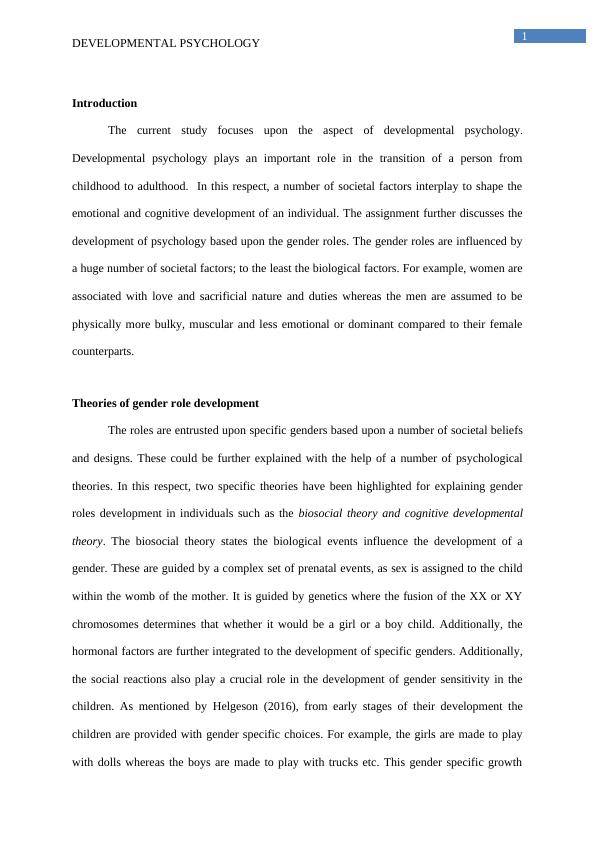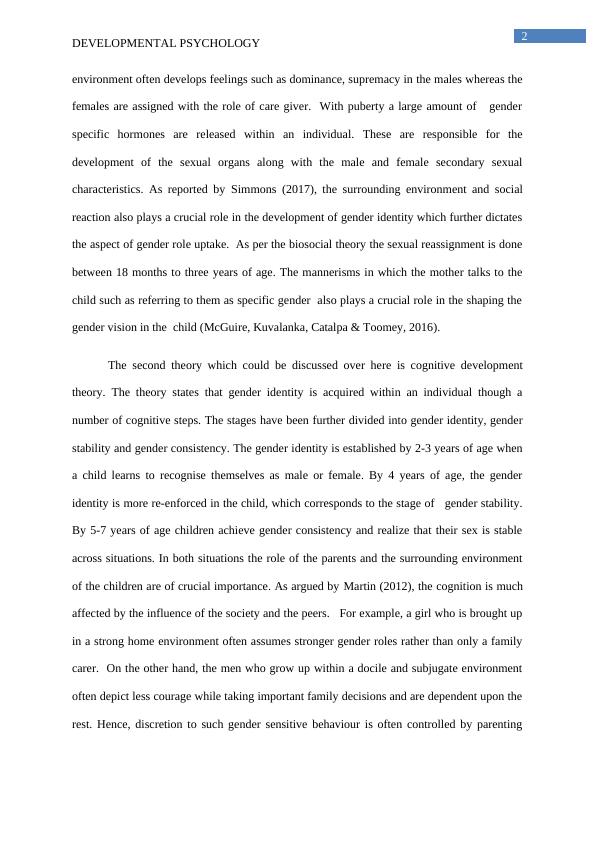Developmental Psychology: Theories of Gender Role Development
Added on 2023-06-13
6 Pages1503 Words199 Views
Running head: DEVELOPMENTAL PSYCHOLOGY
Developmental psychology
Name of the student
University name
Author’s note
Developmental psychology
Name of the student
University name
Author’s note

1
DEVELOPMENTAL PSYCHOLOGY
Introduction
The current study focuses upon the aspect of developmental psychology.
Developmental psychology plays an important role in the transition of a person from
childhood to adulthood. In this respect, a number of societal factors interplay to shape the
emotional and cognitive development of an individual. The assignment further discusses the
development of psychology based upon the gender roles. The gender roles are influenced by
a huge number of societal factors; to the least the biological factors. For example, women are
associated with love and sacrificial nature and duties whereas the men are assumed to be
physically more bulky, muscular and less emotional or dominant compared to their female
counterparts.
Theories of gender role development
The roles are entrusted upon specific genders based upon a number of societal beliefs
and designs. These could be further explained with the help of a number of psychological
theories. In this respect, two specific theories have been highlighted for explaining gender
roles development in individuals such as the biosocial theory and cognitive developmental
theory. The biosocial theory states the biological events influence the development of a
gender. These are guided by a complex set of prenatal events, as sex is assigned to the child
within the womb of the mother. It is guided by genetics where the fusion of the XX or XY
chromosomes determines that whether it would be a girl or a boy child. Additionally, the
hormonal factors are further integrated to the development of specific genders. Additionally,
the social reactions also play a crucial role in the development of gender sensitivity in the
children. As mentioned by Helgeson (2016), from early stages of their development the
children are provided with gender specific choices. For example, the girls are made to play
with dolls whereas the boys are made to play with trucks etc. This gender specific growth
DEVELOPMENTAL PSYCHOLOGY
Introduction
The current study focuses upon the aspect of developmental psychology.
Developmental psychology plays an important role in the transition of a person from
childhood to adulthood. In this respect, a number of societal factors interplay to shape the
emotional and cognitive development of an individual. The assignment further discusses the
development of psychology based upon the gender roles. The gender roles are influenced by
a huge number of societal factors; to the least the biological factors. For example, women are
associated with love and sacrificial nature and duties whereas the men are assumed to be
physically more bulky, muscular and less emotional or dominant compared to their female
counterparts.
Theories of gender role development
The roles are entrusted upon specific genders based upon a number of societal beliefs
and designs. These could be further explained with the help of a number of psychological
theories. In this respect, two specific theories have been highlighted for explaining gender
roles development in individuals such as the biosocial theory and cognitive developmental
theory. The biosocial theory states the biological events influence the development of a
gender. These are guided by a complex set of prenatal events, as sex is assigned to the child
within the womb of the mother. It is guided by genetics where the fusion of the XX or XY
chromosomes determines that whether it would be a girl or a boy child. Additionally, the
hormonal factors are further integrated to the development of specific genders. Additionally,
the social reactions also play a crucial role in the development of gender sensitivity in the
children. As mentioned by Helgeson (2016), from early stages of their development the
children are provided with gender specific choices. For example, the girls are made to play
with dolls whereas the boys are made to play with trucks etc. This gender specific growth

2
DEVELOPMENTAL PSYCHOLOGY
environment often develops feelings such as dominance, supremacy in the males whereas the
females are assigned with the role of care giver. With puberty a large amount of gender
specific hormones are released within an individual. These are responsible for the
development of the sexual organs along with the male and female secondary sexual
characteristics. As reported by Simmons (2017), the surrounding environment and social
reaction also plays a crucial role in the development of gender identity which further dictates
the aspect of gender role uptake. As per the biosocial theory the sexual reassignment is done
between 18 months to three years of age. The mannerisms in which the mother talks to the
child such as referring to them as specific gender also plays a crucial role in the shaping the
gender vision in the child (McGuire, Kuvalanka, Catalpa & Toomey, 2016).
The second theory which could be discussed over here is cognitive development
theory. The theory states that gender identity is acquired within an individual though a
number of cognitive steps. The stages have been further divided into gender identity, gender
stability and gender consistency. The gender identity is established by 2-3 years of age when
a child learns to recognise themselves as male or female. By 4 years of age, the gender
identity is more re-enforced in the child, which corresponds to the stage of gender stability.
By 5-7 years of age children achieve gender consistency and realize that their sex is stable
across situations. In both situations the role of the parents and the surrounding environment
of the children are of crucial importance. As argued by Martin (2012), the cognition is much
affected by the influence of the society and the peers. For example, a girl who is brought up
in a strong home environment often assumes stronger gender roles rather than only a family
carer. On the other hand, the men who grow up within a docile and subjugate environment
often depict less courage while taking important family decisions and are dependent upon the
rest. Hence, discretion to such gender sensitive behaviour is often controlled by parenting
DEVELOPMENTAL PSYCHOLOGY
environment often develops feelings such as dominance, supremacy in the males whereas the
females are assigned with the role of care giver. With puberty a large amount of gender
specific hormones are released within an individual. These are responsible for the
development of the sexual organs along with the male and female secondary sexual
characteristics. As reported by Simmons (2017), the surrounding environment and social
reaction also plays a crucial role in the development of gender identity which further dictates
the aspect of gender role uptake. As per the biosocial theory the sexual reassignment is done
between 18 months to three years of age. The mannerisms in which the mother talks to the
child such as referring to them as specific gender also plays a crucial role in the shaping the
gender vision in the child (McGuire, Kuvalanka, Catalpa & Toomey, 2016).
The second theory which could be discussed over here is cognitive development
theory. The theory states that gender identity is acquired within an individual though a
number of cognitive steps. The stages have been further divided into gender identity, gender
stability and gender consistency. The gender identity is established by 2-3 years of age when
a child learns to recognise themselves as male or female. By 4 years of age, the gender
identity is more re-enforced in the child, which corresponds to the stage of gender stability.
By 5-7 years of age children achieve gender consistency and realize that their sex is stable
across situations. In both situations the role of the parents and the surrounding environment
of the children are of crucial importance. As argued by Martin (2012), the cognition is much
affected by the influence of the society and the peers. For example, a girl who is brought up
in a strong home environment often assumes stronger gender roles rather than only a family
carer. On the other hand, the men who grow up within a docile and subjugate environment
often depict less courage while taking important family decisions and are dependent upon the
rest. Hence, discretion to such gender sensitive behaviour is often controlled by parenting

End of preview
Want to access all the pages? Upload your documents or become a member.
Related Documents
The Developmental Debate on Gender Identitylg...
|3
|373
|14
Influence of Biological and Social Factors on Childhood Developmentlg...
|8
|2434
|89
Sociological Perspectives on Gender and Sexuality: Everyday Experiences and Issueslg...
|10
|3423
|99
Biological and Social Influences on Individuals during Developmentlg...
|9
|2717
|52
Understanding Transgender Development: Biological, Psychological, and Social Factorslg...
|3
|400
|160
Gender and Sexuality: Theoretical Perspectives and Media Influencelg...
|12
|4028
|142
